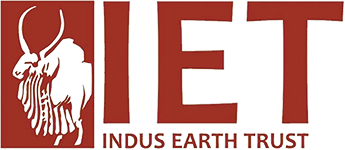Introduction
Indus Earth Trust has started a water replenishment project in Kohistan, Thatta district. Coca-Cola has offered financial support for this initiative. The project will serve around 34 villages and 2,200 families, with a total population of 15,000 people, and will aim to achieve Sustainable Development Goals (SDG) 3 (Better Health and Wellbeing) and 6 (Clean Water and Sanitation). Water is the world’s most valuable natural resource. Many people take it for granted. Populations are becoming more conscious of the necessity of water for human survival and its scarcity. Kohistan union council is located in an exceedingly arid location with no water supply.
The Water for Women – I project focusses on water replenishment and intends to give access to water through groundwater replenishment and rainfall gathering. The project will focus on water replenishment in Kohistan through rainwater gathering, rehabilitation of existing dug wells, capping and installation of hand pumps, and the construction of check dams. Hand pumps have also been constructed at rainwater reservoirs. Women are also responsible for supplying water to the village.
Currently, women in Kohistan carry 10-15 litre containers on their shoulders or heads. They walk between one and five km to reach a water source. Typically, they make two journeys to get adequate water for their household and livestock. This idea attempts to reduce the burden of water carried by women by making it more accessible to them. The initiative includes training the community on better practices in water, sanitation, health, and hygiene (WASH). This will be accomplished by the formation of community organizations comprised of both men and women. Schools will host WASH awareness programs for children.
Women-centered trainings have been organized to educate village women on health and hygiene practices. This is a key aspect of the project. Women are the fiber of society, and it is their responsibility to pass teachings along to the next generation. They are also primary cares, thus it is even more important to keep them informed about health and cleanliness in order to decrease preventable infections. One thousand local women will be trained. A guidebook outlining water replenishment procedures, WASH guidelines, and gender balancing concepts was created specifically for this community.
Rainwater Harvesting Reservoirs
Rainwater harvesting is the process of collecting, purifying, storing, and utilizing rainwater for irrigation and other applications. Rainwater is collected when it falls to the ground, stored, and used later when needed. It can be cleansed, making it suitable for human consumption. It is used on a daily basis as well as in huge industrial settings.
Rainwater is free of pollutants, salts, minerals, and other natural and man-made impurities. In locations with high rainfall, excess rainwater can be used to recharge groundwater using artificial recharge techniques. Rainwater harvesting is a solution that has been used in many parts of the world where traditional water delivery systems are unavailable or have failed to meet people’s needs. It is a centuries-old technique for collecting water.
Rainwater collection can occur on both a local and large scale. A simple, economical, technically viable, and socially acceptable safe drinking water delivery system for geo-hydrological locations (rural/urban) can be implemented. In Kohistan, rainwater harvesting systems can be considered a solution to the problem of contaminated ground water, particularly in arsenic and saline-affected areas. The physical, chemical, and bacteriological properties of captured rainfall make it a suitable and acceptable source of drinkable water.
Hand pumps
Hand pump is a traditional method of obtaining groundwater in rural areas of the Sindh; hand pump will lift water from an average depth of 25 to 35 feet. A foundation of hand pump will be constructed for community keeping pitchers and jars in it. The design of the structure considers easy access by everyone. Indus Earth Trust ensures water laboratory test of each and every drinking water source. In addition, water scheme is built, before delivery of its function to the target communities; a water quality test is carried out. The test is to ensure the suitability of the water for drinking and identify any potential microbiological contamination and for further treatment. Hand pumps were installed at 10 locations identified with safe drinking water. Hand pumps provide water extracted from the ground, purifying it through the sand.
Focus on Gender Mainstreaming
Fetching water is the primary task of women, in rural as well as poor urban localities. In rural areas, in communities living far from a suitable water source, women and girls spend several hours a day traveling to collect water to meet their family’s needs. As this task is so time consuming, young girls are unable to get educated. Providing a water source close by will reduce demand on their time and will enable them to undertake other productive activities to better their lives. It also lessens the physical burden, which has been documented to have an adverse effect on their body. The proposed Water for Women Project, in Kohistan aims to reduce hardship by making clean water sources accessible and teaching filtration techniques to ensure water is safe for human consumption.
Water Wheels for Women
Indus Earth Trust has introduced water wheels to transport water, particularly over great distances. These can hold 30-35 liters, which is twice the capacity of traditional containers. Women just need to make one journey to the water source. Women must push the water wheel to relieve the weight of carrying the water container off their shoulders and heads, resulting in improved health.
Objectives
- Social Mobilization and community organization of targeted communities
- Water Replenishment through rain water harvesting
- Access safe drinking water through hand pumps
- Train local women in WASH specifically water purification through the water sand filtration
- Reduce labor of women through water wheels









